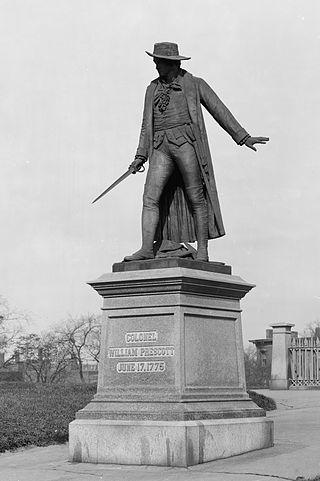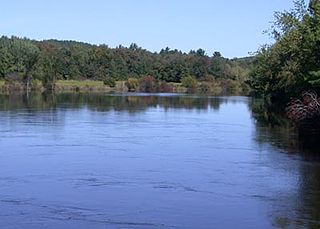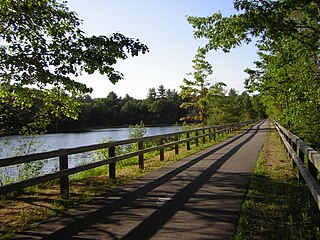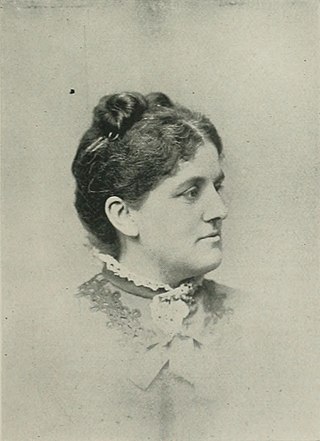Related Research Articles

Dunstable is a town in Middlesex County, Massachusetts, United States. The population was 3,358 at the 2020 census.

East Pepperell is a village and census-designated place (CDP) in the town of Pepperell in Middlesex County, Massachusetts, United States. The population was 2,120 at the 2020 census.

Brookline is a town in Hillsborough County, New Hampshire, United States. The population was 5,639 at the 2020 census, up from 4,991 at the 2010 census. Brookline is home to the Talbot-Taylor Wildlife Sanctuary, Potanipo Pond, and the Brookline Covered Bridge.

Hollis is a town in Hillsborough County, New Hampshire, United States. The population was 8,342 at the 2020 census, growing 9% from the 2010 population of 7,684. The town center village is listed on the National Register of Historic Places as Hollis Village Historic District.

William Prescott was an American colonel in the Revolutionary War who commanded the patriot forces in the Battle of Bunker Hill. Prescott is known for his order to his soldiers, "Do not fire until you see the whites of their eyes", such that the rebel troops may shoot at the enemy at shorter ranges, and therefore more accurately and lethally, and so conserve their limited stocks of ammunition. It is debated whether Prescott or someone earlier coined this memorable saying.

Groton is a town in northwestern Middlesex County, Massachusetts, United States, within the Greater Boston metropolitan area. The population was 11,315 at the 2020 census. It is home to two prep schools: Lawrence Academy at Groton, founded in 1792 and the third-oldest private school in Massachusetts; and Groton School, founded in 1884.

The Nashua River, 37.5 miles (60.4 km) long, is a tributary of the Merrimack River in Massachusetts and New Hampshire in the United States. It is formed in eastern Worcester County, Massachusetts, at the confluence of the North Nashua River and South Nashua River, and flows generally north-northeast past Groton to join the Merrimack at Nashua, New Hampshire. The Nashua River watershed occupies a major portion of north-central Massachusetts and a much smaller portion of southern New Hampshire.

New Hampshire Route 111 is a 50.027-mile-long (80.511 km) east–west highway in Hillsborough and Rockingham counties in southeastern New Hampshire. The road runs from the Massachusetts border at Hollis to North Hampton on the Atlantic shore.

The Nashua River Rail Trail is a 12.5-mile (20.1 km) paved mixed-use rail trail in northern Massachusetts and southern New Hampshire under control of the Massachusetts Department of Conservation and Recreation (DCR). It roughly follows the course of the Nashua River, passing through the towns of Ayer, Groton, Pepperell, and Dunstable, Massachusetts and ends about a mile across the New Hampshire state border in Nashua, New Hampshire. The trail is used by walkers, cyclists, inline skaters, equestrians, and cross-country skiers.
Barzillai Lew was an African-American soldier who served with distinction during the American Revolutionary War.

John Robinson was a Massachusetts militia and Continental Army officer from Westford, Massachusetts during the American Revolutionary War. On April 19, 1775, during the Battle of Concord, Robinson was the second highest-ranking officer in the field after Colonel James Barrett. Robinson marched next to Major John Buttrick at the head of the American column which advanced on and defeated the British Regulars at the Old North Bridge that day. Robinson would later fight at the Battle of Bunker Hill, serve under General George Washington during the Siege of Boston and, in 1786, he would take part in the agrarian insurrection known as Shays' Rebellion.

Job Shattuck was a British colonial soldier during the Seven Years' War and a member of the Massachusetts state militia during the American Revolutionary War. He first served with the British in the 1755 Battle of Fort Beauséjour. He was later active at the Siege of Boston in 1776 and then in preparing defenses at Mt. Independence and Ft. Ticonderoga later that year.

Pepperell is a census-designated place (CDP) comprising the main village in the town of Pepperell in Middlesex County, Massachusetts, United States. The population was 2,390 at the 2020 census, out of 11,604 in the entire town of Pepperell.

Pepperell is a town in Middlesex County, Massachusetts, United States. The population was 11,604 at the 2020 census. It includes the village of East Pepperell. Pepperell is home to the Pepperell Center Historic District, a covered bridge, and the 1901 Lawrence Library. The library has a collection of Sidney M. Shattuck's (1876–1917) stuffed birds.

Sheila Curran Harrington is an American politician and attorney. She represented the 1st Middlesex district in the Massachusetts House of Representatives from 2011 until February 2022, when she resigned to take up the position of Clerk Magistrate of the Gardner District Court. She is a member of the Republican party.
Prudence "Pru" Cummings Wright was a militia commander during the American Revolutionary War.
This is a timeline of women in warfare in the United States before 1900.This list includes women who served in the United States Armed Forces in various roles. It also includes women who have been Warriors and fighters in other types of conflicts that have taken place in the United States. This list should also encompass women who served in support roles during military and other conflicts in the United States before the twentieth century.

Deane Winthrop was the sixth son of the English Puritan colonist John Winthrop, a founder and the 2nd, 6th, 9th and 12th Governor of the Massachusetts Bay Colony. His mother was Margaret Tyndal. He was named after his mother's half-brother, Sir John Deane. He outlived all of his full and half-siblings. There is no known portrait of him.
Anna Maria Lane was the first documented female soldier from Virginia to fight with the Continental Army in the American Revolutionary War. She dressed as a man and accompanied her husband on the battlefield, and was later awarded a pension for her courage in the Battle of Germantown.

Harriette R. Shattuck was an American author, parliamentarian, teacher of parliamentary law, and pioneer suffragist. Shattuck served as assistant clerk of the Massachusetts House of Representatives in 1872, being the first woman to hold such a position. She wrote several books, including The Story of Dante's Divine Comedy (1887), Our Mutual Friend: A Comedy in Four Acts, Dramatized from Charles Dickens (1880), The "national" Method (1880), Marriage, Its Dangers and Duties (1882), Little Folks East and West (1891), Woman's Manual of Parliamentary Law (1891), The Woman's Manuel of Parliamentary Law (1895), Shattuck's Advanced Rules for Large Assemblies (1898), Our Mutual Friend: A Comedy, in Four Acts (1909), and Shattuck's Parliamentary Answers, Alphabetically Arranged (1915).
References
- 1 2 3 4 5 6 Frank, Lisa Tendrich (2013). An Encyclopedia of American Women at War: From the Home Front to the Battlefields. ABC-CLIO. p. 668. ISBN 9781598844436 . Retrieved 29 April 2018.
- 1 2 3 4 5 6 7 Bell, Jerri; Crow, Tracy (2017). It's My Country Too: Women's Military Stories from the American Revolution to Afghanistan. University of Nebraska Press. p. 19. ISBN 9781612349343 . Retrieved 29 April 2018.
- 1 2 3 4 5 6 Wike, Sudie Doggett (2018). Women in the American Revolution. McFarland. p. 41. ISBN 9781476630878 . Retrieved 29 April 2018.
- ↑ Fischer, David Hackett (1995). Paul Revere's Ride . Oxford University Press. p. 166. ISBN 9780199779659 . Retrieved 29 April 2018.
- ↑ Frank, Lisa Tendrich (2013). An Encyclopedia of American Women at War: From the Home Front to the Battlefields. ABC-CLIO. p. 669. ISBN 9781598844436 . Retrieved 29 April 2018.
- 1 2 3 4 5 6 Shattuck, Mary L. P. (1899). Prudence Wright and the Women who Guarded the Bridge. Wheeler Print.